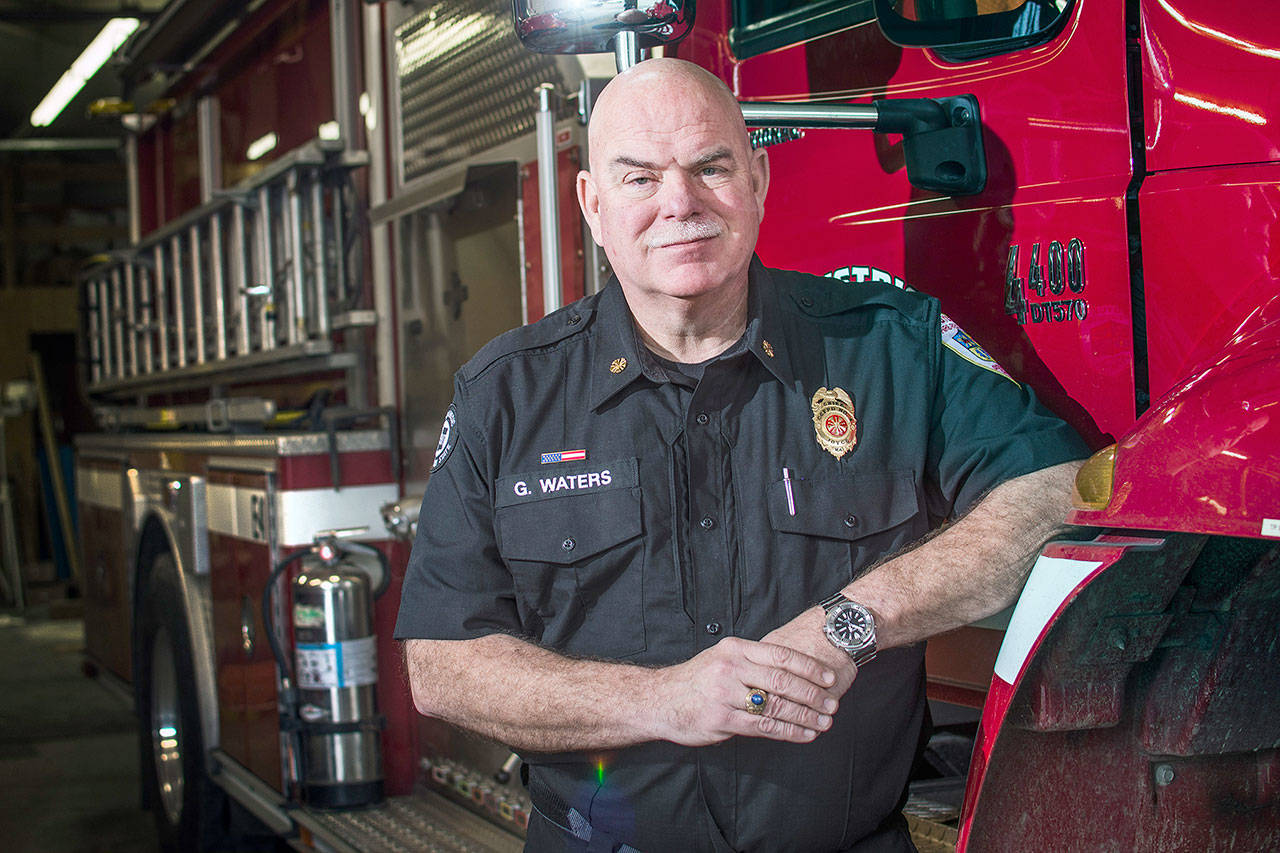JOYCE — After a few months on the job as Joyce’s first full-time fire chief, Greg Waters said the experience has been like “drinking from the proverbial fire hydrant.”
Waters’ first day as chief of Clallam Fire District No. 4 was Aug. 15 after he was selected to be the department’s first full-time fire chief. Until then the position had been strictly volunteer and was most recently held by Alex Baker, who is continuing with the district as an assistant chief.
Waters said that over the years it has become clear that it was unrealistic to expect the district’s top position to be on a volunteer basis.
“Even though we’re a volunteer department, it doesn’t alleviate that we have to do the same things as a full career fire department has to do,” Waters said. “We have all the same reporting responsibilities, the same training requirements and the same maintenance on our vehicles.
“To do that and run the call volume we have, there was just no way someone could do that on a volunteer basis and have any kind of life.”
Waters said that in his 10 years as a member of Clallam Fire District No. 4, he has been grateful for the support the community provides to the fire district.
He said since he took the helm in August, Clallam Fire District No. 4 has received donations from the Gossett Foundation, the Joyce Fire Auxiliary, the Joyce Daze Wild Blackberry Festival Committee and the Joyce Grange as well as significant private donations.
“We’ve been very proud of the public support we have,” he said.
The fire district began its recruiting process when Baker announced in mid-summer 2017 that he wanted to give up his position as chief while still remaining a volunteer with the department.
Waters was one of many candidates from across the United States. He started with the district in June 2009 as a volunteer firefighter.
“This is a monumental step and investment for the Joyce Fire District as our community takes this step toward new goals to meet the objectives of our public service mission to keep our residents and area visitors safe,” said Fire Commissioner Marcus “Ben” Pacheco.
“We are all so excited and feel fortunate to be able to promote this management talent from within our own volunteer workforce.”
Waters is a graduate of the United States Naval Academy and served as a special duty/cryptologic officer. He was deployed on numerous classified assignments on reconnaissance aircraft, ships and submarines.
He said he began to miss the excitement that the Navy offered; that was among the reasons he volunteered with the fire district.
About six years ago, Waters became the first paramedic in the district. Since then there has been one other paramedic and another person is currently in training.
“The goal is to have three in the district,” he said. “That gives us a lot more capabilities to help the residents of Joyce.”
He said previously Joyce residents had to rely on Advanced Life Support (ALS) services being provided by paramedics in Port Angeles. On the unlikely chance that of the district’s paramedics are out of the area, Waters said ALS can still be provided by Clallam Fire District No. 2 or Olympic Ambulance.
Waters said the fire district faces a number of challenges.
He said that while staffing levels are similar to when he started about 10 years ago, it has become increasingly difficult to recruit volunteers and call volumes have nearly doubled.
Part of the challenge, he said, is that the fire district demands more from volunteers than it used to.
“We have great volunteers,” he said. “We have a handful of people who respond to a lot of calls and others respond whenever they can. We appreciate any effort they can give.”
He estimate about 160 to 180 calls per year when he started with the department but said this year Clallam Fire District No. 4 is on track for about 300 calls for service.
Another challenge the district faces is funding. He said timber revenues — a major portion of the budget — are not what they used to be.
The department looks toward a new station sometime in the future. Waters said the current station in Joyce would not be adequate in an emergency — such as a massive quake like scientists predict at some point from the Cascadia Subduction Zone off the West Coast.
“This would not serve well in a Cascadia-type of event,” he said. “This is a cinder block building and we need to look to the future and find a way to secure a new fire station.
“We need to continue to find additional sources of revenue.”
________
Reporter Jesse Major can be reached at 360-452-2345, ext. 56250, or at jmajor@peninsuladailynews.com.

